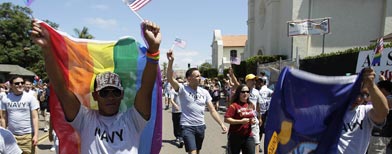Military members march for San Diego gay pride
-

SAN DIEGO (Reuters) - A group of U.S. service members marched in a San Diego gay pride parade on Saturday, in a demonstration organizers touted as an unprecedented step for gay and lesbian military personnel under the Pentagon's "Don't Ask, Don't Tell" policy.
The military contingent in the parade numbered about 250 people, and the former Navy operations specialist who brought the group together said many are currently in the military, while the rest are veterans. They dressed in civilian clothes.
Marine Corporal Will Rodriguez-Kennedy is on active duty and said he looks forward to next year's parade, when he believes it will be possible to march in "dress blues."
"One of my friends here has been back from Afghanistan for three days, and when he heard about the parade he said he served in uniform and he should be able to march in uniform," said Rodriguez-Kennedy, 24.
It was unclear exactly how many members of the San Diego gay pride parade's military contingent were on active duty. Several participants who spoke to Reuters had recently left the armed services.
Under the military's existing "Don't Ask, Don't Tell" policy, service members are barred from saying they are gay or lesbian, and that has until now discouraged some members of the military from participating in gay pride parades.
Organizers said the San Diego contingent, which included straight supporters also in the armed services, represented the largest group of members of the military to ever march in the city's gay pride parade, or any similar U.S. event.
Gay service members have been known to march in other pride parades, but usually in a low-key manner without calling attention to themselves.
COURT DECISION
The march came a day after a three-judge panel of the U.S. 9th Circuit Court of Appeals temporarily reinstated the military's "Don't Ask, Don't Tell" policy on gays, but blocked the Pentagon from penalizing or discharging anyone for being openly gay. The decision marked a reversal from an earlier order to immediately end the policy.
President Barack Obama signed legislation in December to repeal "Don't Ask, Don't Tell," but the bill gave the Pentagon an unlimited time frame to implement the change, leading up to a final "certification" of the repeal.
That certification is expected within weeks.
In a parade that featured drag queens costumed as nuns and men dressed as pirates with G-strings, the military contingent of mostly men in their 20s and 30s marched in markedly more conservative clothing.
They wore green or grey t-shirts emblazoned with their military branch, and each carried in hand a small U.S. flag.
"This is my first time here, out as who I am: a gay man in the Army Reserves," Dale Smith, 50, told Reuters. "It's a great day for me and for all the gay people who've chosen to serve their country."
A Pentagon spokeswoman said U.S. Department of Defense regulations do not prohibit marching in parades while wearing civilian clothes, and that participation "does not constitute a declaration of sexual orientation."
The military contingent in the San Diego parade was organized by Sean Sala, an openly gay 26 year-old man, who left the Navy in June after six years.
"When we were walking, every step of the way it was standing ovations from the crowd," Sala said. "My mom was with me and it made her cry."
San Diego, California's second-largest city, has a large military presence. The nearby Camp Pendleton is the largest Marine Corps base west of the Mississippi River.